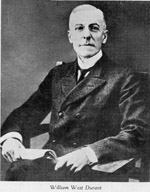 William West Durant
William West Durant I am trying my best to stick to generally known facts about the life of William West Durant. There are some things one just can't make up - like the date of his birth, or when he lived where. The fact that he divorced, was under financial duress, was sued by his sister - these are facts.
What we may never really know however is what was going on in his mind while he was living his life. What was he thinking when he built that $200,000 yacht while sending his sister a paltry $200/month allowance to live on in England? There is the court testimony from his sister's lawsuit (Heloise Durant Rose vs. William West Durant, 1903) that sheds some light on the actual scandal. But it doesn't answer the question: where was William's chivalry?
And why did he divorce his wife after ten years of marriage and three children? The divorce case papers are sealed - I only have a few news articles written in 1898 to go by - will we ever really know what went on between William and Janet behind bedroom doors? I have to let my imagination wander.
And what was he thinking when he built the Great Camp Uncas or Sagamore in the Adirondacks? Did he really need to? What was he trying to prove? What was his motivation? Surely it could not be all for show and tell.
I know once I present my own fictional version of what might have motivated the man there will be those that will disagree with my interpretation. Let them.
I am not writing this story to try to break new ground on the historian's account of his life. I am writing it to elucidate for the general public: a story of a man that embodies a lot of the human frailties and greatness that we all have within us.
And what makes it even more interesting, to me anyway, is that his cross-cultural experience shaped him in ways that his biographers may have only touched upon.
Finally, this story is about re-thinking how we interpret the past. Because what is known about William West Durant, was mostly written while he was still alive, in the early 1920s and 30s - a time when he was completely cognizant and able to 'talk it up' (see Donaldson and Hochschild under sources). He was if nothing else, a positivist. And he was generally well-liked by all of those who knew him, including his workers. Craig Gilborn's account (see sources) is the first to examine the financial machinations behind much of the family's downfall.
Along the way though I have discovered a few errors in William's biography. Slight exaggerations of the truth one might say. It was to be expected given that William was the one relating his story in his old age to oral historians. I am looking forward to discovering more about him (hopefully) on my journeys this summer. I will keep everyone informed - stay tuned.
 RSS Feed
RSS Feed
